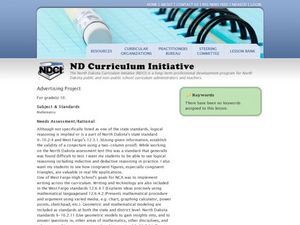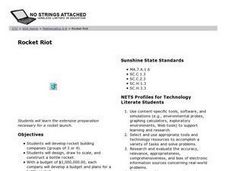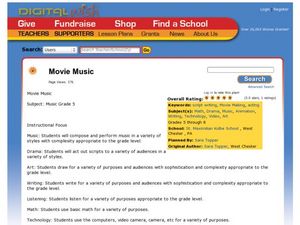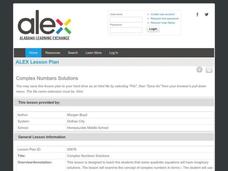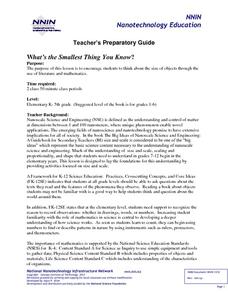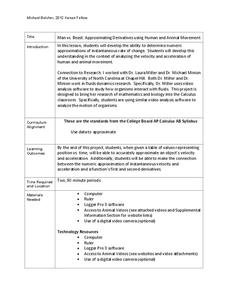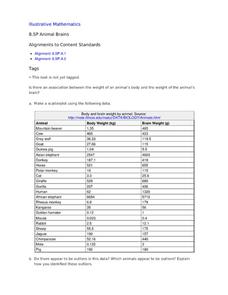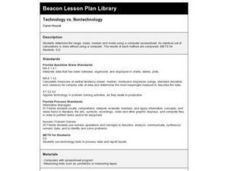Curated OER
Deductive and Inductive Reasoning
Students differentiate between inductive and deductive reasoning. For this geometry lesson, students identify congruent figures and examine logos for congruency.
Curated OER
Technobiz
Students examine candy preferences to create a plan in order to improve candy sales. In this technobiz instructional activity, students build spreadsheet and organizational skills by graphing and calculating data. Students are introduced...
Curated OER
Rocket Riot
Middle schoolers form "companies" of 3-4 students and build bottle rockets for analysis and experiment. This lesson uses NASA's RcketModeler Version 1.2 rocket simulator to evaluate each rocket's flight.
Curated OER
Exploring Today's Technology
Second graders explore technology. In this science lesson, 2nd graders discuss various forms of technology. Students research technology that they use everyday and write a sentence about each one of the technologies.
Curated OER
Movie Music
Students discover film making by participating in a music performance. In this performance arts lesson, students perform music and physical acting to convey an already written script for their peers. Students collaborate with...
Curated OER
Edible Math
Second graders use M&M candies to graph colors, illustrate story problems and practice hands-on math. They use spreadsheets, worksheets and graphs to organize math problems that use M&M's.
Curated OER
Pets Galore!
Fourth graders conduct a class survey on the number of pets that the 4th grade owns and they record that data in their math notebooks. They make a bar graph displaying the results using a spreadsheet through Microsoft Excel.
Curated OER
Luxury Hotel
Give the most important people watching the Olympics a beautiful place to stay! Learners create a luxury hotel for the games using AppleWorks, fractions, and their knowledge of perimeter and area. The math lesson includes resource links...
Curated OER
The Quadratic Formula
Students complete math problems involving the quadratic formula. Using Internet technology, they visit web sites to answer questions about polynomials and the quadratic formula. Students explore the degree of a polynomial, the purpose of...
Curated OER
MAISA and the REMC Association of Michigan
Students complete online research to study geography's impact on weather. In this geography and weather lesson, students research weather in their city for ten days using an online website. Students bookmark the site, enter data into a...
Mathematics Assessment Project
Designing 3d Products: Candy Cartons
Wouldn't it be great to work in a candy factory? Learners get their chance as they first design a carton for a candy that meets certain requirements. They then examine and analyze nets and explanations in sample student responses.
Alabama Learning Exchange
Complex Numbers Solutions
Complex doesn't have to mean harder! Learners experiment with online software to determine the quadratic equations with complex solutions. They use the quadratic formula to solve equations with both real and complex solutions.
Statistics Education Web
It Creeps. It Crawls. Watch Out For The Blob!
How do you find the area of an irregular shape? Class members calculate the area of an irregular shape by finding the area of a random sampling of the shape. Individuals then utilize a confidence interval to improve accuracy and use a...
Civil War Trust
Map the Civil War
Mapmaking was a very important element in successfully planning attacks on enemies during the Civil War. Guide pupils through the process of pacing to find the average length of their steps, measure the distance between one object...
National Nanotechnology Infrastructure Network
What’s the Smallest Thing You Know?
Elementary learners listen to a story, then sort objects from largest to smallest at six different stations around the classroom. Adaptable for a large range of age and ability groups.
NASA
Just How Far is That Star?
Pupils often wonder how we know the distance to various stars. Starting with a thought experiment and progressing to a physical experiment, they determine the brightness and distance to various stars. The evaluation requires...
Kenan Fellows
Man vs. Beast: Approximating Derivatives using Human and Animal Movement
What does dropping a ball look like as a graph? An engaging activity asks learners to record a video of dropping a ball and uploading the video to software for analysis. They compare the position of the ball to time and calculate the...
Curated OER
Animal Brains
Do big bodies make big brains? Let your learners decide whether there is an association between body weight and brain weight by putting the data from different animals into a scatterplot. They can remove any outliers and then make a line...
Microsoft
Arrays
Zoos are just elaborate arrays. Scholars learn the meaning of arrays and how to create them in Minecraft. Applying this knowledge, they write a program to create a zoo within the game's world. They also complete an independent project...
Curated OER
Design-a-Lesson-Packaging a Product
Learners in a teacher education class address consumer related issues involving packaging. Using volume, surface area and graphs, they create a package for a given volume of a product. They design modifications for this lesson and to...
Curated OER
Tessellations in Excel
Pupils complete an Excel project on tessellations. In this technology and math lesson, students discuss tessellations and their occurrences in nature. Pupils use the Excel computer program to create tessellations.
Curated OER
TE Lesson: Navigating at the Speed of Satellites
Learners study the basic concepts of the Global Positioning System and how it increases the accuracy of navigation. They examine trilateration and how the speed of light is used to calculate distances.
Curated OER
Technology vs. Nontechnology
Fourth graders determine the range, mean, median and mode using a computer spreadsheet. An identical set of calculations is done without using a computer. The results of each method are compared. They calculate the mode, median and range...
Curated OER
Apple Logic and Problem Solving
Students examine apple production in the United States. In this interdisciplinary lesson, students use problem solving strategies introduced to solve math problems associated with apple production in the United States. Student collect...
Other popular searches
- Math Technology Lesson Plans
- Technology Math Lesson Plan
- Math Lessons Using Technology
- Math Lessons With Technology
- Math Lesson Using Technology


